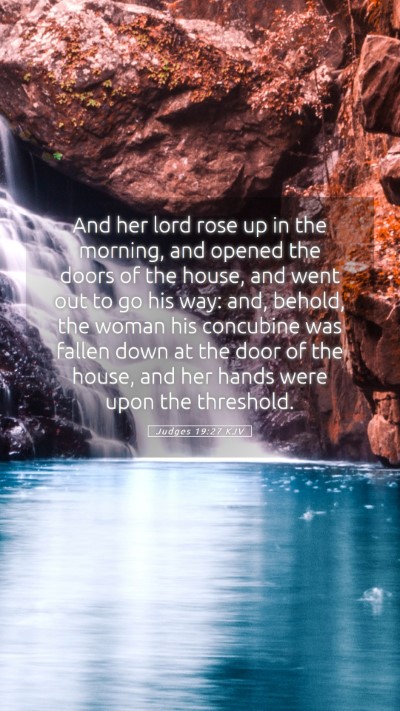Judges 19:27 - Bible Verse Overview
The verse reads: "And when her lord rose up in the morning, and opened the doors of the house, and went out to go his way, behold, the woman his concubine was fallen down at the door of the house, and her hands were upon the threshold." (Judges 19:27, KJV). This passage presents a disturbing scene that plays a crucial role in understanding the wider narrative of Judges, highlighting themes of betrayal, violence, and the moral decay of Israel during the time of the judges.
Bible Verse Meanings and Interpretations
This verse serves as a profound illustration of the corrupted societal values and the implications of personal choices. By examining the text through the lens of various public domain commentaries, we can derive deeper meanings:
- Matthew Henry Commentary: Henry explains that this verse depicts the tragic fate of the concubine, symbolizing the treatment of women in ancient Israel. He emphasizes the lack of compassion shown by the Levite and the horror that ensues from a society devoid of God's guiding principles. The neglect and abuse culminate in a haunting image, representing the depths of darkness that the nation had sunk into.
- Albert Barnes Notes: Barnes elaborates that this moment is pivotal in the narrative, as it sets off a chain of events that will lead to significant conflict within Israel. The Levite's reaction to find his concubine in such a state illustrates the emotional desensitization that can occur in an environment rife with sin and moral failing. Barnes stresses the importance of this passage for understanding the consequences of societal decay.
- Adam Clarke's Commentary: Clarke adds a layer of historical and cultural analysis, noting that the actions of the Levite reflect a larger pattern of injustice and violence. He contextualizes the scene within the broader framework of the Israelite community's departure from the covenant, emphasizing the implications of their descent into chaos. Clarke argues that the haunting imagery serves as a warning against the neglect of moral responsibility.
Historical Context of Judges 19
The Book of Judges, set in a chaotic period for Israel, showcases the struggles of a nation without a central king or unified leadership. The events leading to Judges 19:27 reflect a broader narrative of violence and retribution, serving as a backdrop for understanding God's displeasure with His people. In this context, Judges 19 reveals the dire consequences of a society that has abandoned divine guidance.
Biblical Exegesis and Scripture Analysis
In conducting a biblical exegesis of Judges 19:27, several layers are revealed:
- Emotional Response: The verse captures the raw emotions of shock and horror. It invites readers to empathize with both the victim and the Levite, who is compelled to confront the reality of his actions and their repercussions.
- Cultural Norms: This verse reflects the cultural practices of the time, including the role of concubines and the treatment of women. It raises questions about agency, consent, and the societal obstructions to justice.
Application of Judges 19:27 in Modern Life
Understanding the implications of Judges 19:27 can serve as a poignant reminder of the importance of compassion and justice in our communities. It encourages contemporary readers to reflect on social justice issues, particularly concerning the treatment of marginalized individuals.
Related Bible Cross References
- Genesis 19:4-11 - The destruction of Sodom and Gomorrah.
- Judges 20:1-28 - The war against Benjamin over the Levite's concubine.
- Proverbs 28:5 - The consequences of wickedness upon society.
Conclusion
The message of Judges 19:27, while unsettling, serves as a vital part of the biblical narrative that highlights the need for righteousness and adherence to God's laws. Through diligent Bible study and exploration of scripture analysis tools, individuals can deepen their understanding of difficult Bible passages and apply Biblical principles to contemporary issues.
For Bible Study Groups and Online Discussions
- Consider how historical context influences today’s moral landscape.
- Discuss the depiction of women in the Bible and its relevance today.
- Reflect on themes of justice and mercy within your community.


